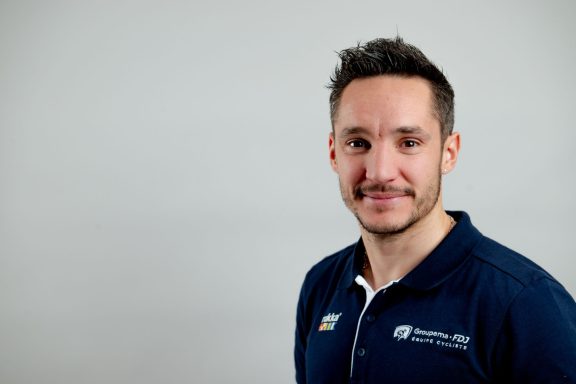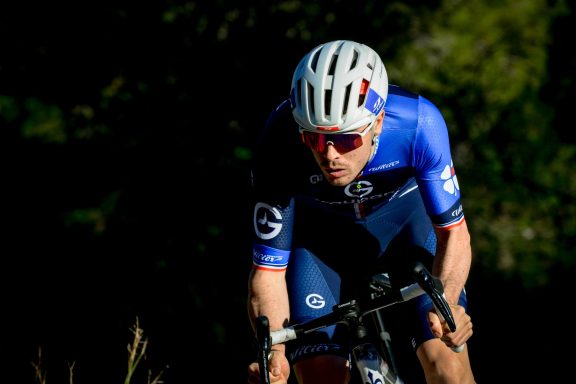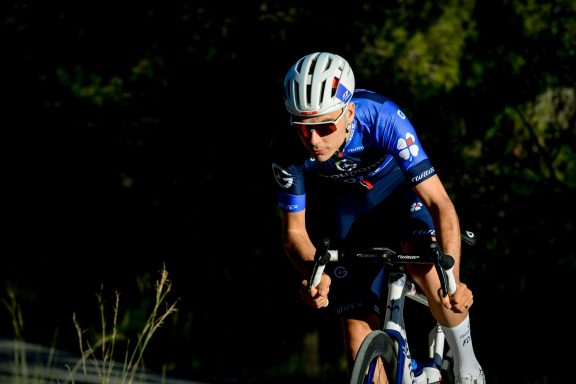A former member of the “Conti” Groupama-FDJ, where he spent two seasons, Jake Stewart certainly was one of the surprises in this start of the 2021 season. A rider of the WorldTeam since last fall, the 21-year-old Englishman indeed showed himself in almost every race he took part in this year, before he broke his hand in Cholet-Pays de Loire. While waiting to return on the road, “Jakey” told us more deeply about his great start, his passion for the Classics and his future goals.
How do you assess your start of the season, Jake?
I think I can be pretty happy with the season so far. I first had some good results in Bessèges and I was then second in the Omloop Het Nieuwsblad. To get a podium in a WorldTour race is obviously a good result in your first year at that level. Due to the Covid situation, I could not attend the team camp in Spain in January, so I wasn’t really sure where my condition was. I think I’ve proven that I worked hard back home in the UK. I started the season really motivated and I got some good results to show for it. I’m still 21 years old, and to step up from the U23 ranks to the WorldTour peloton is not a small thing. I’m racing against seasoned pros and guys who are the best in the sport, so I did not really expect to be this good this early on. It shows that if you work hard, you can indeed perform at this level, against these guys and even fight for the win. Of course, it still comes a bit as a surprise that I have made the step so « easily ». So I can be really happy with how it has been so far.
Where have you surprised yourself the most?
I think the Omloop was probably the biggest surprise so far. I felt so strong on the day and the only reason that I missed the win was because I was not so well positioned in the final two corners, which was down to my own error. I felt so good and was always in front of the race. I just found myself too far back a couple times in the climbs and had to close gaps, but I still had some power in the end. I think the time trial Bessèges was equally a surprise for me because it has always been my « weak point » as a Junior and U23 rider. I’ve always got a bit stuck in on that discipline in stage races in the past. Being able to perform a top 10, in what was basically a WorldTour field, was certainly unexpected. Yet, when you ride the kits and equipment that we’ve got here in the team, that you put in the efforts to go well in a time trial and that your head is in a good place, then pretty much everything is possible.
“The Omloop certainly made me change my approach”
Have you any regret regarding the first races of the season?
The way I rode Omloop was not perfect. Going into the race, I wasn’t really expecting to be there in the finish, so I kind of wasted energy where I did not need to and did not position myself as well as I should have done. In the final, I also lost Kevin and Stefan about three kilometres to go and did not find Kevin until the last 500 meters. I should have fought a little harder to hold their wheels. I should have saved some energy earlier in the race; I could have positioned myself better so I did not need to close gaps. Looking back now, this is definitely a race that I’ve taken a lot of lessons from. Deep down, I think I could have won it. I think the biggest error was that I did not go into the race thinking I could do it.
At one point did you realize you could do something?
I was starting to suffer a bit, but I realized I just needed to go over the Bosberg to get to the finish. Fred [Guesdon] was telling me the same on the radio. Sure enough, I got over the Bosberg in the front group and we had a little discussion with Kevin, Stefan and with Fred from the car. We decided to protect me, try to do a good lead-out and position well into the final corners to go for the win. I think they were as surprised as I was to see me there, but going for me was probably the best option that day considering the finish. Then, I was just focused on getting a result. I did not really feel the pressure. I knew what my job was for the last twenty kilometers and I made sure to recover as much as possible. When Stefan and Kevin started to ride for me, I certainly knew I needed to do something special. When I lost their wheels, there was a moment that I said to myself: « you need to concentrate, don’t f** around, and get yourself back in a good position ». I fought back to try to get to Geniets and I probably took some risks to take his wheel again, but in the end, the responsibility was on me for the finish.
What has this race changed for you?
It certainly changed my approach afterwards, because I actually realized I can compete in these races, and I can race for the win rather than ‘’just’’ sacrifice myself. Even the team plans changed. Before the Omloop, my role was just to help the team, they did not really expect me to be there in the finish. They now see me more as a protected rider, as I also have a good sprint and can get a good place or even the win if it ends with a group. It has definitely changed the approach for myself but also the tactical approach by the team.
“Pressure is not really something that’s been on my mind”
You still had some responsibilities beforehand, in Bessèges for example.
I think I proved last year in the Tour du Limousin that I could race at a high level and get good results. For me, it did not really come as a surprise to have this kind of responsibility early in the season. Obviously, I spoke with the team over the winter and it was made clear to me that I’m also here to try to win races, especially in the French Cup and in smaller French races. I gladly accept these responsibilities, as I want to win bike races anyway!
Isn’t it too much pressure for someone of your age?
Pressure is not really something that’s been on my mind. I’m just as hungry to win bike races as everyone else. At the end of the day, I’m racing bikes, and I just enjoy doing that more than anything. I just want to get my hands in the air, do my best and give something back to the team. If the guys are pulling for me, I want to repay all that hard work with a good result. Pressure is not really something that has come across my mind recently. As long as it stays like that, I will carry on performing. More than anything, these responsibilities show the confidence the team has in me. They are also aware of the kind of results I can make. If the plan is to ride for me, then everyone is on board. It’s a big responsibility, but when you’ve proven the kind of pedigree you are, it seems natural.
After the Omloop, some people might have thought of you as a sprinter.
For sure, I’m nowhere near a pure sprinter. In the races where there are pure sprinters, I’m not performing as highly as I would be if this were a Classic race or just a hard race. I just haven’t got that pure speed and power in the finish. Even in Cholet, it would have been hard to beat Viviani. By no means I’m that kind of rider. I’ve just got a good kick after a long hard day on the saddle. I think I’m definitely more of a Classic rider or a guy for small bunch sprints. That being said, I’m always happy to try to compete for the win, whether that’s a big bunch kick or a smaller bunch finish. Also, it’s not necessarily all about pure power at the end of the day. A lot of it comes down to positioning and lead-outs. Anything can happen in a bunch sprint and I always try to put myself in the best position. Whether I’m sprinting against pure sprinters or guys that are slightly slower, I just try to come away with the best possible result.
“Winning a race is definitely high in my goals for this year”
In what race circumstances do you feel most confident?
I feel a lot more confident and comfortable in the sprints when it’s a smaller bunch, with 30-40 guys. Whether that’s a Classic race, a small uphill sprint, it’s equally the same. There is less stress and it’s easier to position yourself. With some fatigue in the legs, it makes the sprint a bit harder, which is what I enjoy more, and where I excel the most. Now, my heart is certainly in the Classics. I have kind of proven that I can compete in these races, and these are the ones I enjoy the most. It’s always a hard out on the bike and the time goes pretty fast in these races. That’s where I want to see myself progress as a rider and excel in my career. That is what I want to target going forward.
What have you learned and what do you still need to improve in the Classics?
The Classics’ racing is such a special kind of racing. It’s pretty different from anything else on the calendar. There are plenty of lessons to learn but I think the biggest thing is just positioning. That’s how you can win or lose a race in the Classics, even 100 kilometers from the finish. It’s important to be on the right place the whole race and to conserve energy to be able to get a good result. In order to perform, you need to be really switched on the whole day and be concentrated 100%. As well as the physical fatigue, there is a lot of mental fatigue because you’re constantly fighting for position, for 5h30. For me, the biggest thing to master is probably riding in the echelons. As a Junior or U23 rider, that’s something you don’t experience a lot since you only do 3-4 Belgian races during the season. Riding in the echelons in the WorldTour peloton is completely different from what I’ve done in the past. It’s certainly something I need to work on if I want to be able to perform in Classics races in the future. In most of them, you do have crosswinds, and you can win or lose a race based on where you are. You might have the best legs on the day, but if you miss the vital split, it’s all over. Given my background and the kind of rider I am, positioning is not that much of a problem, but I still need to improve in the echelons.
Will winning be a priority for you in the rest of the season?
Winning a race is definitely high in my goals for this year. I’ve been chasing that win for so long already. I think I’ve proven with my results recently that it is just around the corner. After this short break and once I start racing again, looking to get my hands in the air will be one of the main goals. It would also be good for the morale and the head. I feel it’s been a long way coming. I haven’t won a UCI race yet, and it’s always nice if you can take you first pro victory as a neo-pro. It is certainly possible but it also comes down to a bit of luck in the day, and good legs for sure.
“I have an understanding of where my position is in this team”
Since the Omloop, it also looks like your popularity has shot up…
Right after the race, I got a lot of Twitter notifications and there were a lot of comments from some of the biggest British riders and commentators. I noticed straight away there was media and public hype around that result. This is like that with any rider that makes a breakthrough result. A lot of people started to get excited, especially given the fact that I’m so young. I think some of it also comes down to my personality. After the situation in Cholet, I’ve received so much support and it has been a big realization of the amount of following that I have. There are fans out there that just want to support me. I’m pretty grateful for that. It’s really special to have so much support. It also has been pretty full gas with the interviews since then. A lot of people and media in the UK wanted to get involved with a new rider. I think being a British rider that’s not part of Ineos certainly adds dynamic to their stories and fuels some of the fire for the media.
You are also now listed as a favourite in many races you take part in…
It’s pretty strange indeed. I think if I just did something at Omloop, I might not be listed as a favourite because people might see it as a well-off performance. But I performed in Bessèges, then in Omloop, Nokere, Koksijde… I’ve proven my consistency and therefore people recognize that I might be a bit of a threat.
On a more personal note, how are you settling in the team?
That’s a really nice environment to be in. As I was part of the Conti team for two years before stepping up to the WorldTeam, I obviously have an understanding of the organization and their way of working. When you do understand the team well and the team understands you, it makes for a really good relationship. Also, to be fair, I don’t think much has really changed in how I approach my leader position either. I think I’m quite mature in the way that I act and speak to people. It has come pretty naturally. I also have an understanding of where my position is in this team and in relation to the other riders. I think I can speak openly and honestly with all the team members, and there is always respect. I also made some real progress in French and I always try to make an effort to speak it. It certainly got much better and I found my place well within the team, with the sports directors and the riders alike. My French is good enough now to have a productive conversation with the French guys and that contributes a lot to make good relationships and friendships in this team.



No comment